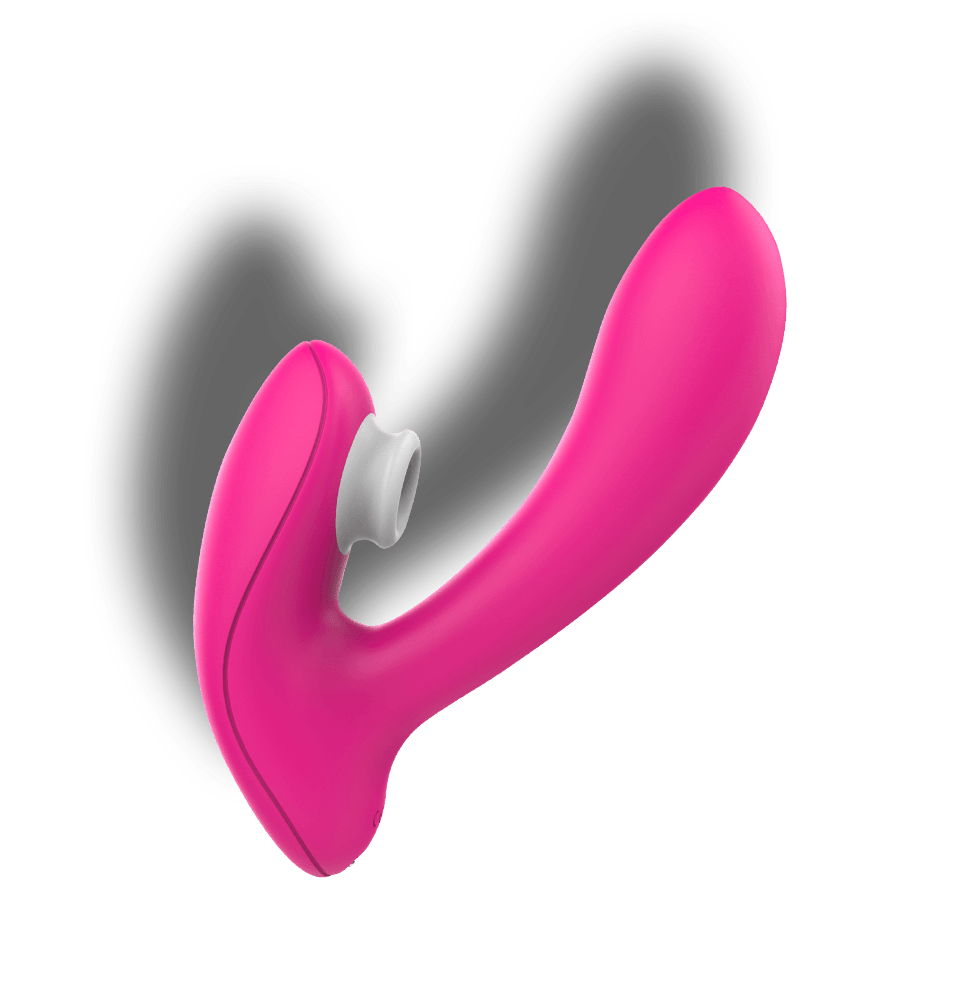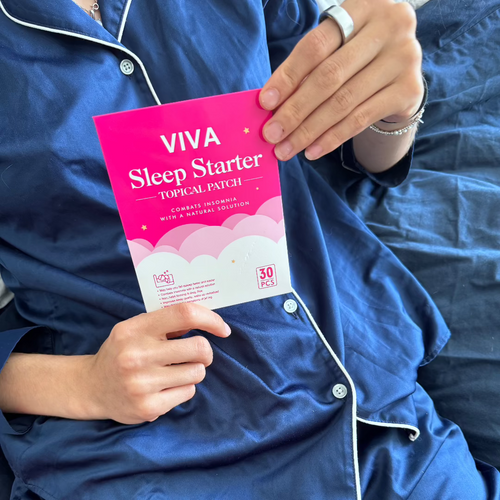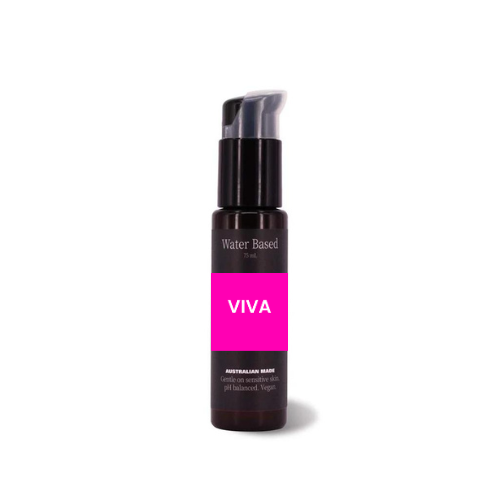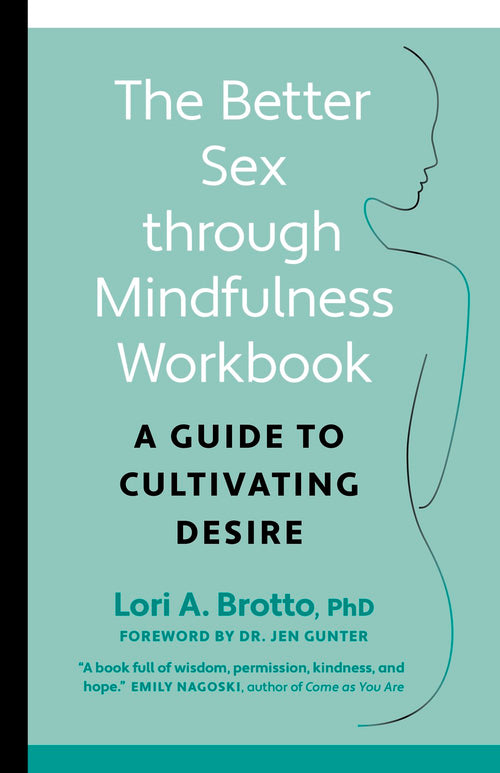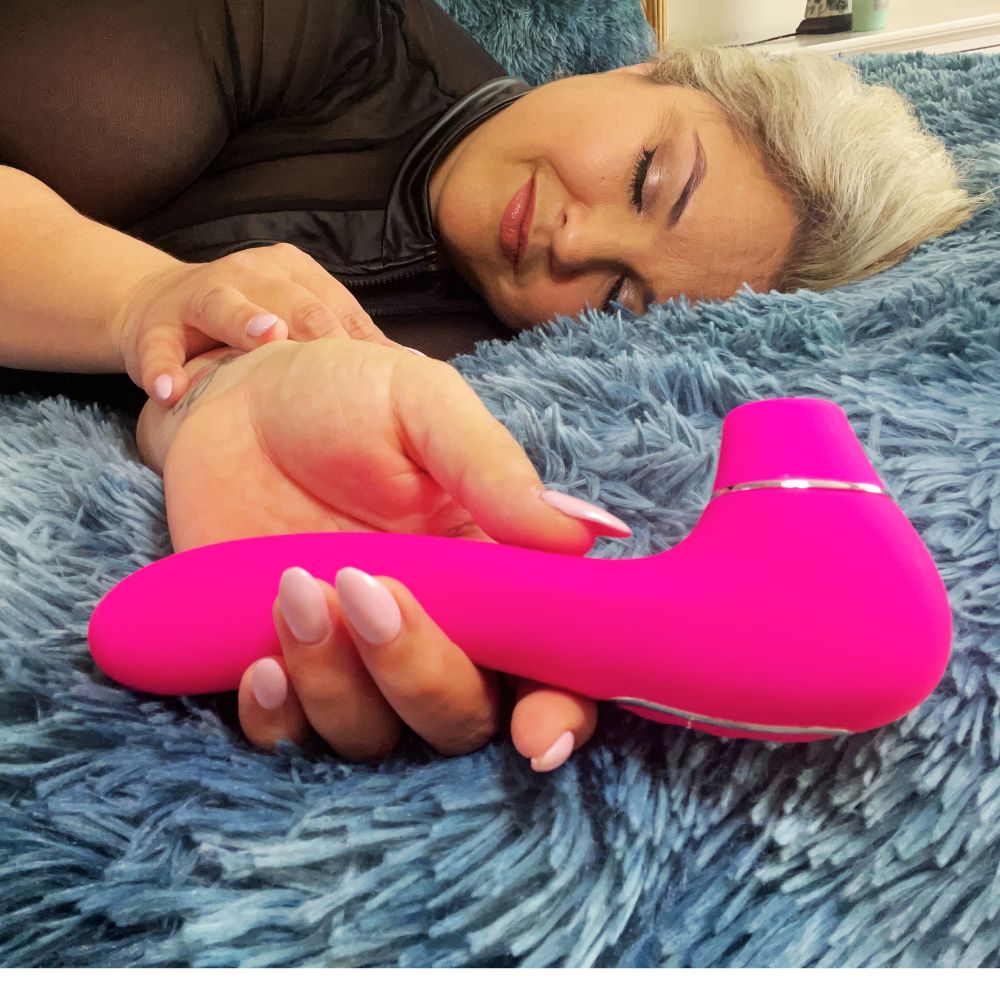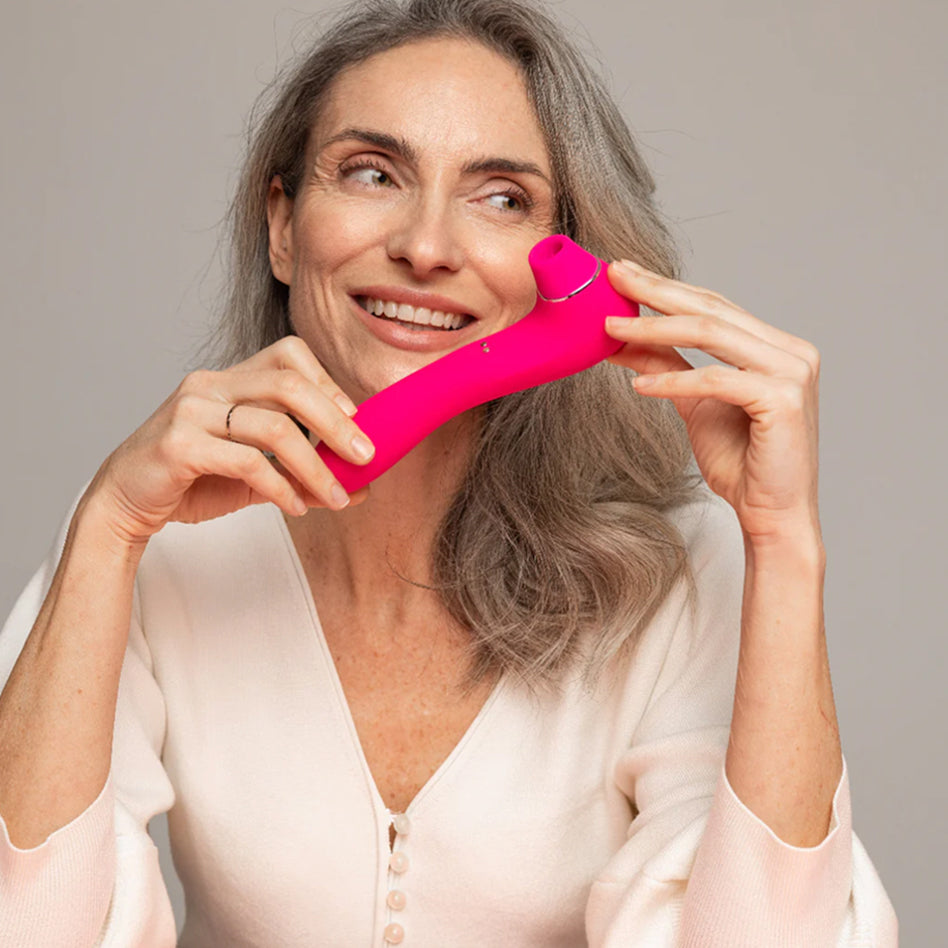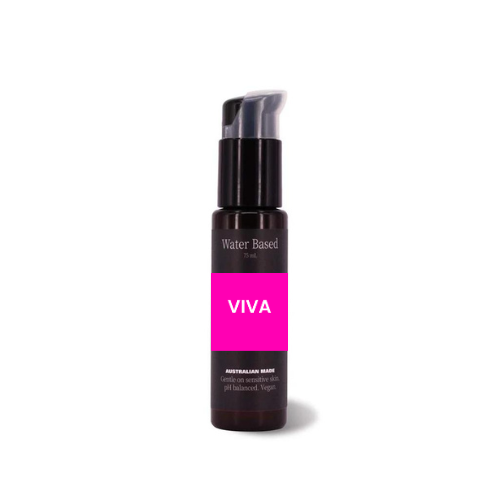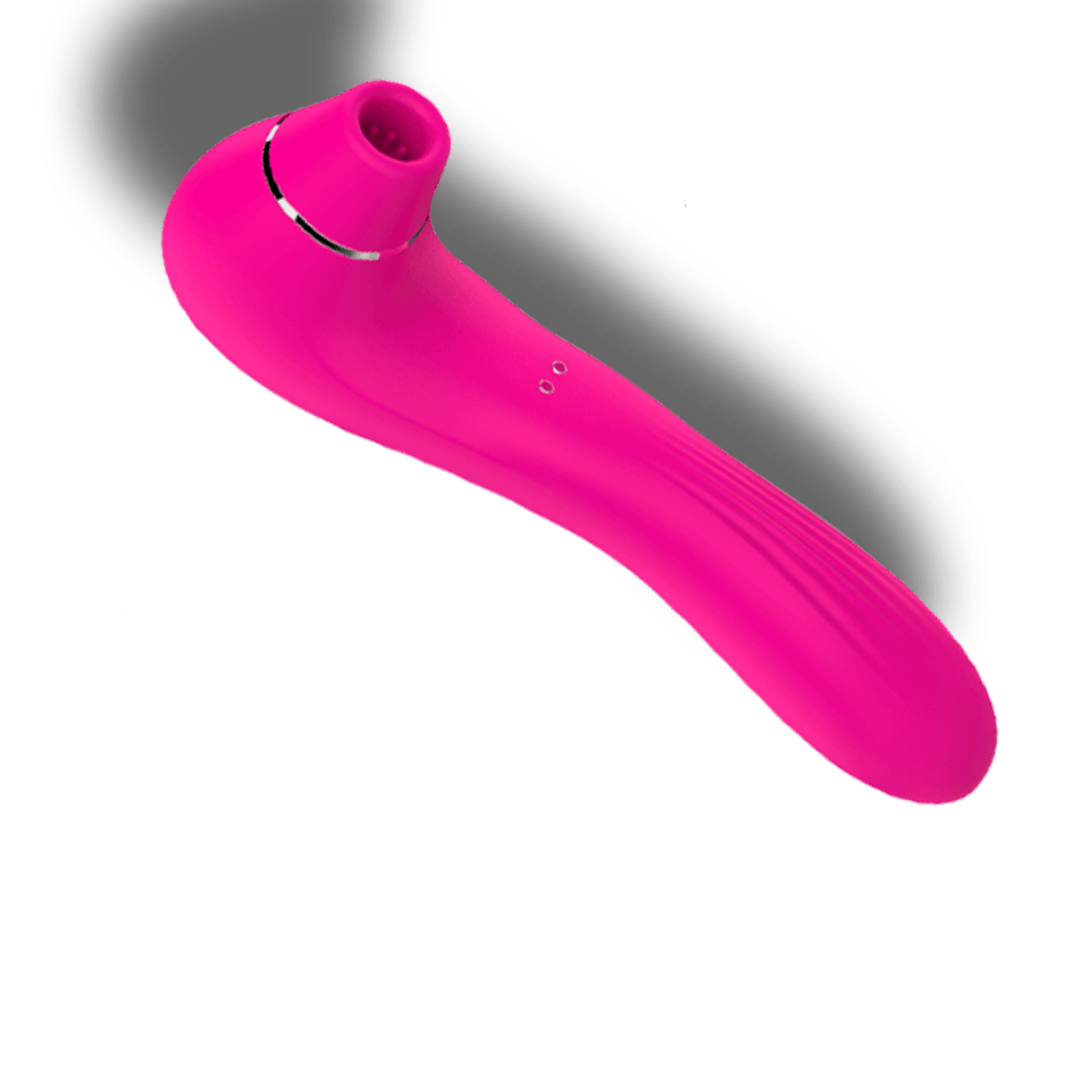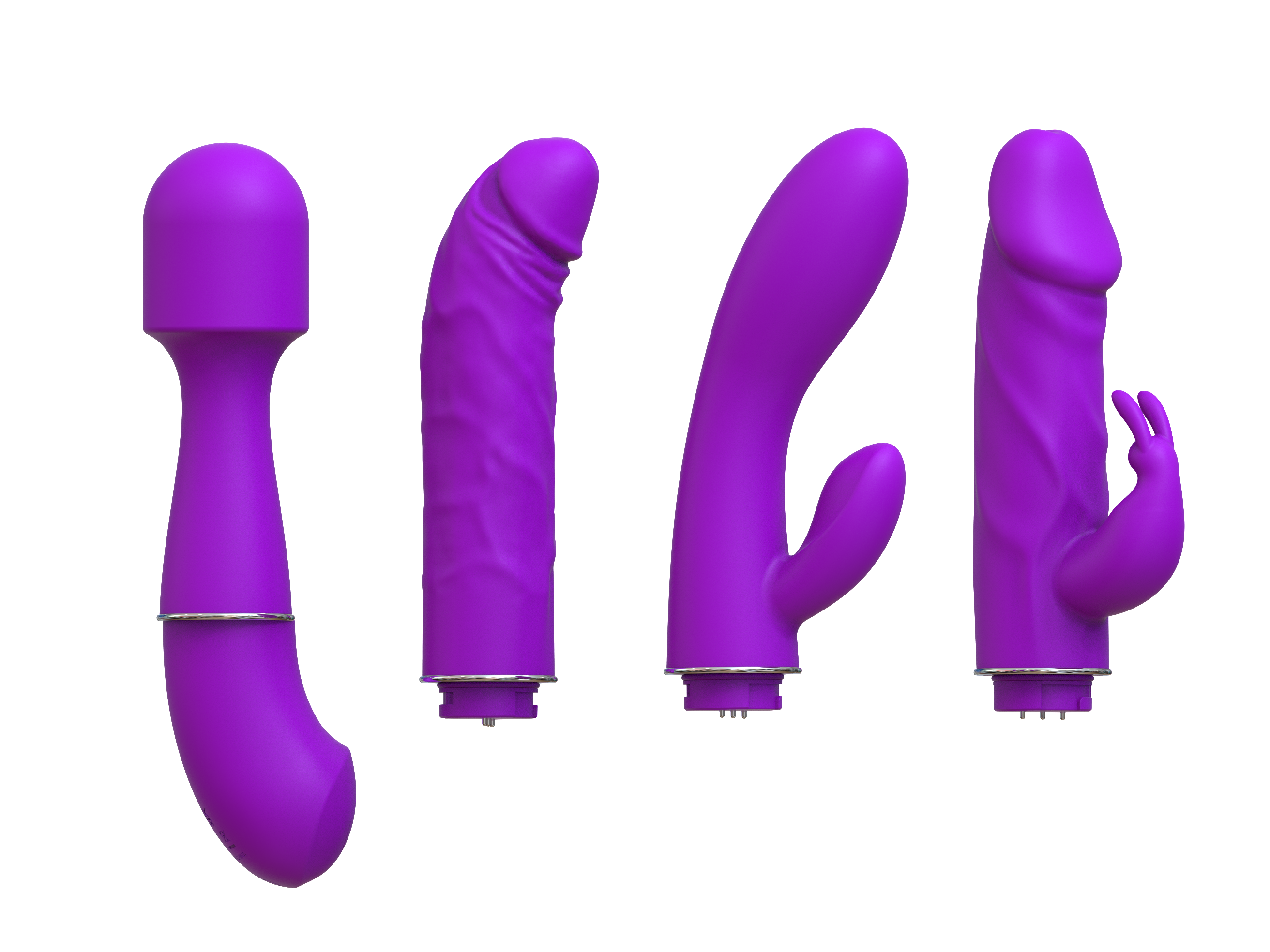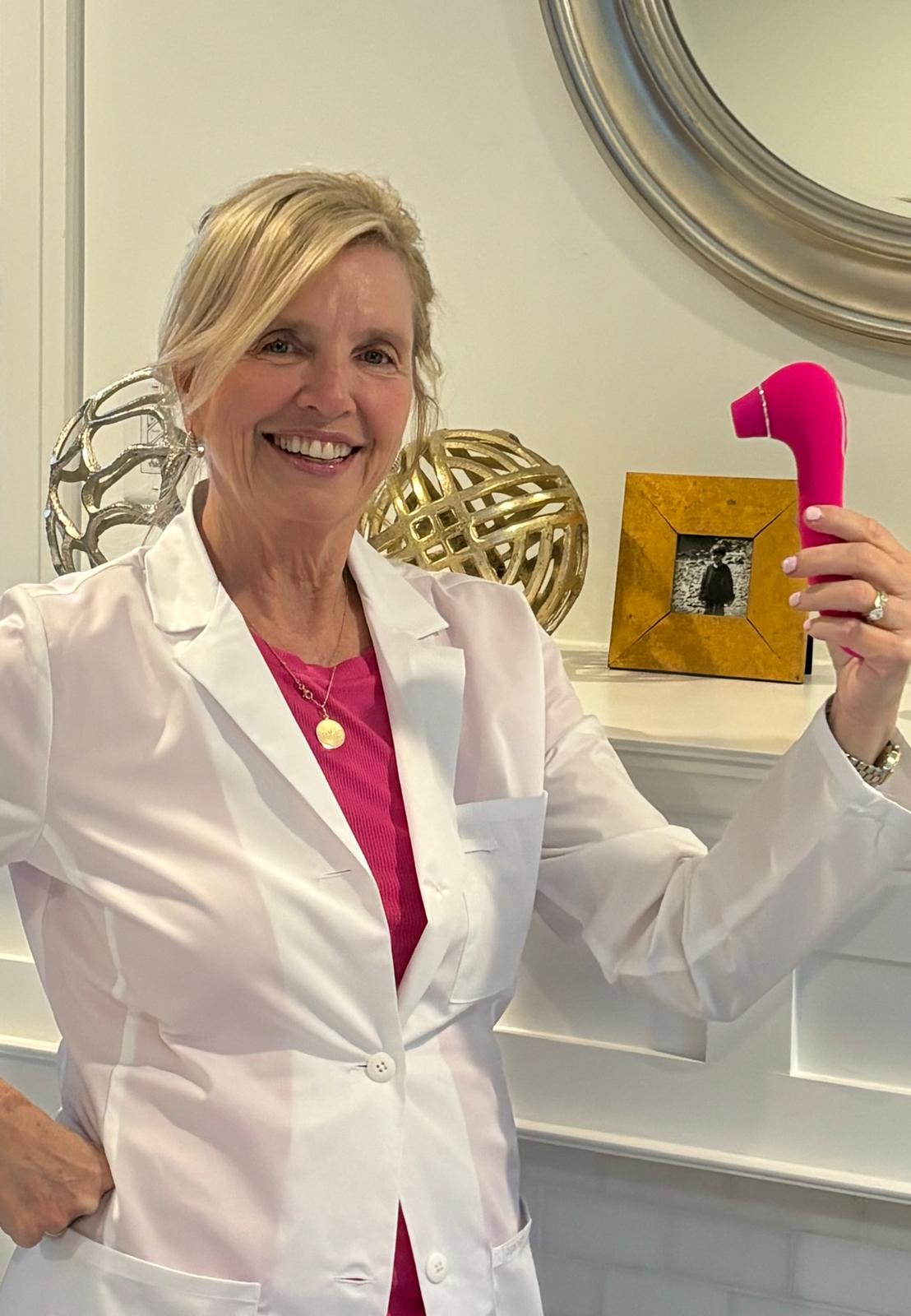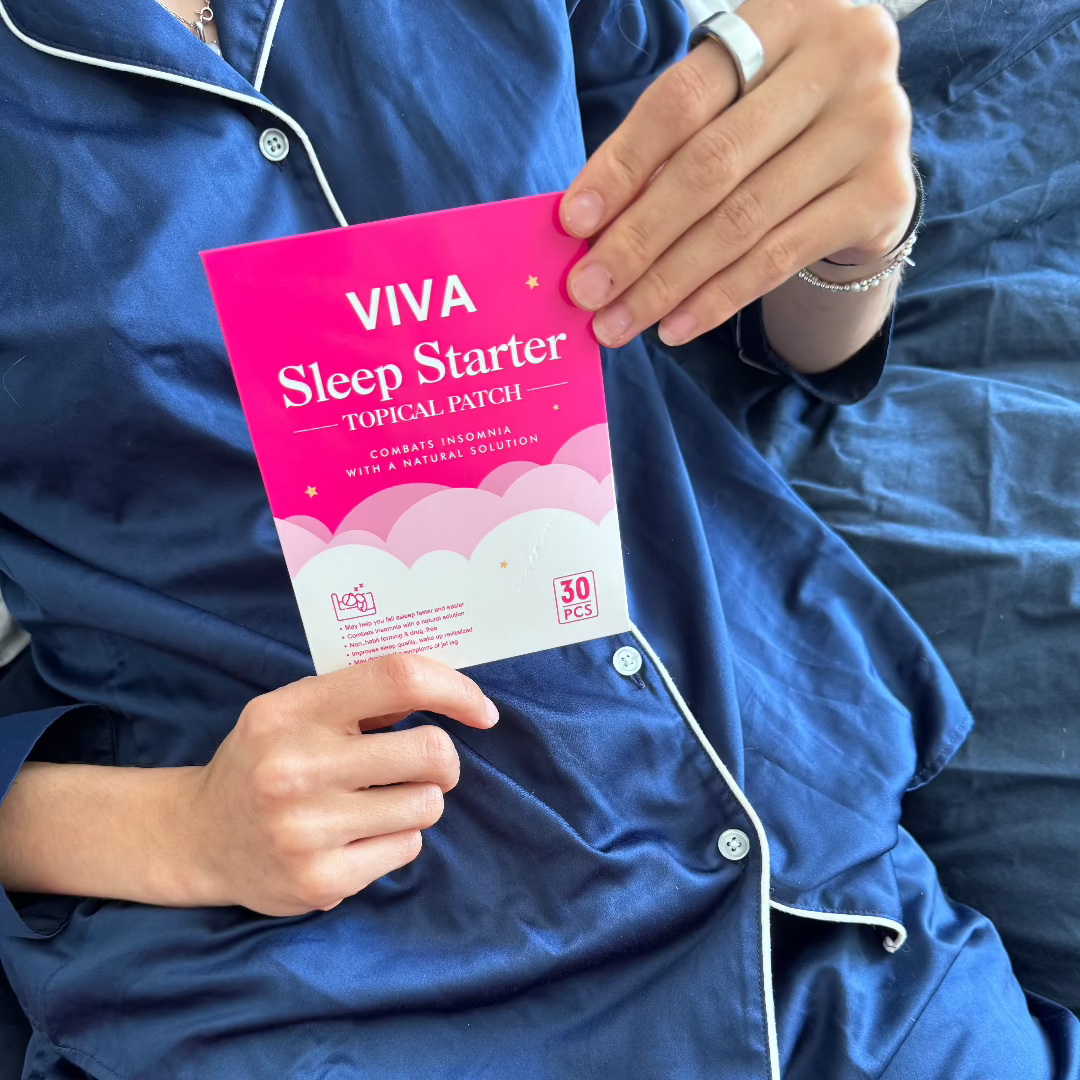What You'll Learn:
- How sleep quality directly impacts sexual health and intimacy for women over 40
- The connection between hormonal changes, sleep disruptions, and reduced sexual desire
- Practical solutions including mindfulness techniques and intimacy products designed for mature women
- How to create a sleep-friendly environment that promotes both rest and intimacy
- Ways to reconnect with your body and enhance pleasure at any age
Key Takeaways:
- Quality sleep is essential for hormonal balance, which directly affects libido and sexual satisfaction
- Perimenopause and menopause can disrupt sleep through hot flashes, night sweats, and anxiety
- Creating a sleep sanctuary with proper temperature, lighting, and comfort enhances both sleep and intimacy
- Mindfulness practices can significantly improve both sleep quality and sexual experiences
- Specialized intimacy products can address age-related changes like vaginal dryness and joint discomfort
- Open communication with partners about changing needs is crucial for maintaining connection
- Nutrition, exercise, and self-care rituals support both better sleep and enhanced intimacy
Introduction: The Sleep-Intimacy Connection for Women 40+
For women over 40, the relationship between sleep quality and intimacy is important yet often overlooked. As we age, our bodies go through big changes that affect both how we sleep and how we feel about sex. At Savvy Viva, we want to help mature women understand these changes and find solutions that work for their specific needs.
Not getting enough sleep doesn't just make you tired—it can really mess with your hormones, energy, and interest in sex in ways younger women might not experience. Research shows that women who don't sleep well report less satisfaction with sex and less interest in physical connection. Studies found up to a 30% drop in sexual desire among women with ongoing sleep problems. This is especially true during perimenopause and menopause, when hormone changes already make both sleep and sex more challenging.
The good news? Understanding this connection gives you the power to make positive changes that can help both areas of your life. By improving your sleep through strategies made for your changing body, you can make your intimate experiences better and feel healthier overall. Studies from the National Sleep Foundation show that women who fix their sleep problems report up to 50% better relationship satisfaction and sexual desire within just a few weeks.
Discover our collection of intimacy products designed for mature women that work alongside these sleep solutions and help you reconnect with your body's natural ability for pleasure. In this article, we'll look at the science behind this connection and give you practical solutions made specifically for women in their 40s and beyond.
How Hormonal Changes Affect Sleep and Intimacy After 40
As women enter their 40s, hormone changes become a big factor in both sleep quality and sexual function. Estrogen and progesterone, which help control sleep cycles and sexual response, start to decrease during perimenopause, often beginning in the early to mid-40s. These hormones don't just affect reproduction – they influence almost every system in your body, including brain chemistry, temperature control, and tissue elasticity, all of which play important roles in both sleep and sexual function.
This transition often brings:
- Night sweats and hot flashes that interrupt sleep cycles, with up to 80% of perimenopausal women experiencing these symptoms that can wake you multiple times nightly, breaking up deep sleep phases essential for physical recovery
- Increased anxiety that makes falling asleep difficult, as changing hormone levels affect brain chemicals like serotonin and GABA that control mood and relaxation
- Vaginal dryness that can make intimacy uncomfortable, with studies showing that up to 60% of postmenopausal women experience this condition due to decreased estrogen levels that reduce natural lubrication
- Mood fluctuations that impact desire and sexual satisfaction, as hormonal shifts affect the brain's pleasure and reward centers
These hormone shifts create a challenging cycle: poor sleep makes hormone imbalances worse, which further impacts both sleep quality and sexual function. Research from the North American Menopause Society shows that women experiencing sleep disruptions have significantly lower levels of sex hormones the following day, creating a feedback loop that can be difficult to break without targeted help. Many women report that their worst sleep problems happen at the same time as their biggest drops in sex drive, confirming this important connection.
Our specially formulated water-based lubricants ($12.00) address one of the most common physical challenges women face during this time. These products are specifically designed to make intimacy more comfortable, helping your body's natural lubrication which may decrease with hormone changes. Unlike regular lubricants, ours contain ingredients that support vaginal tissue health and match the natural pH of mature women, preventing irritation and promoting comfort during intimate moments.
Understanding these connections allows you to take a more complete approach to both sleep and intimacy. Rather than treating these as separate issues, recognizing how they relate opens up more effective solutions. Many women find that addressing their sleep concerns naturally leads to improvements in their intimate relationships, and vice versa. This integrated approach acknowledges the whole-body impact of hormonal changes and provides more lasting results than addressing either sleep or sexual function alone.
Learn more about how the right intimacy products can address age-related changes and help you maintain a fulfilling sexual relationship regardless of hormonal fluctuations. With the right knowledge and tools, this transitional time can become an opportunity for deeper self-understanding and renewed intimate connection.
Creating a Sleep Sanctuary: Environment Matters
Your bedroom environment plays a crucial role in both sleep quality and intimacy. Creating a space that promotes relaxation, comfort, and connection can significantly improve both aspects of your life. Research from the Sleep Foundation indicates that environmental factors can account for up to 40% of sleep quality differences, making this an essential area to address for women experiencing midlife sleep challenges. Consider these elements when designing your sleep sanctuary:
Temperature Regulation
For women experiencing hot flashes or night sweats, maintaining a cool sleeping environment is essential. The ideal sleep temperature actually drops for women during perimenopause and menopause, with studies showing better sleep quality at slightly cooler temperatures than what was comfortable in earlier years. Keep your bedroom between 60-67°F (15-19°C) and consider:
- Moisture-wicking, breathable bedding made from natural fibers like bamboo or lightweight cotton that pulls moisture away from the body and promotes air circulation
- Layered blankets that can be easily removed during night sweats episodes without fully disrupting sleep
- A bedroom fan or air conditioning with programmable settings to maintain optimal temperatures throughout the night
- Cooling pillows or mattress toppers containing gel or phase-change materials specifically designed to dissipate body heat
Comfort and Support
Physical discomfort can disrupt both sleep and intimate moments. As women age, joint sensitivity increases and muscle recovery takes longer, making proper support even more critical for both restful sleep and comfortable intimacy. Invest in:
A quality mattress that supports your changing body is essential, along with pillows that accommodate your preferred sleep position. Orthopedic specialists recommend replacing mattresses every 7-10 years, but women experiencing significant body changes during perimenopause may benefit from reassessing their mattress needs sooner. Our specially designed Sex Cushion ($49.00) provides added support during intimate moments, particularly helpful for women experiencing joint pain or mobility issues. This versatile cushion is firm enough to provide proper alignment while being soft enough for comfort, reducing pressure on sensitive joints during both sleep and intimate activities.
Ambiance and Atmosphere
The right atmosphere can promote both relaxation for sleep and a mood conducive to intimacy. Brain research shows that our brains respond to environmental cues that signal either alertness or relaxation, and creating the right sensory environment can help transition between these states:
- Soft, dimmable lighting with warm tones (below 3000K color temperature) that supports melatonin production while still providing enough illumination for intimacy
- Removal of electronic devices that emit blue light and disrupt sleep hormones, with studies showing that blue light exposure can reduce melatonin production by up to 50%
- Pleasant scents like lavender for sleep (shown to improve sleep quality by 20% in clinical studies) or ylang-ylang for romance (known to reduce heart rate and promote relaxation while maintaining alertness)
- Minimized clutter to reduce visual stress and anxiety, as research indicates that cluttered environments increase cortisol levels and cognitive load
Creating this dedicated space signals to your body and mind that this room is for both rest and connection. Many women find that making these environmental changes leads to improvements in both sleep quality and intimate experiences, creating a positive cycle of wellbeing. The investment in your sleep environment pays dividends not just in better rest but in enhanced capacity for pleasure and connection.
Browse our collection of intimacy products designed to complement your bedroom environment and enhance your experience. These thoughtfully designed items work in harmony with your carefully created sleep sanctuary to support both restful sleep and fulfilling intimacy.
Mindfulness Practices for Better Sleep and Enhanced Intimacy
Mindfulness—the practice of being fully present in the moment without judgment—offers powerful benefits for both sleep quality and sexual satisfaction. For women over 40 dealing with hormone changes, stress, and life transitions, these techniques can be really helpful. Clinical studies show that regular mindfulness practice can improve sleep quality by up to 35% and sexual satisfaction by nearly 30%, making it one of the most effective non-medication approaches for women in midlife.
The Science Behind Mindfulness
Research shows that regular mindfulness practice can:
- Reduce cortisol (stress hormone) levels that interfere with both sleep and sexual desire, with studies showing up to a 23% reduction in cortisol after just eight weeks of regular mindfulness practice
- Increase body awareness and sensitivity by strengthening neural pathways in the insula, the brain region responsible for interoception (awareness of internal bodily sensations)
- Improve focus and attention during intimate moments by strengthening the prefrontal cortex, helping to prevent distracting thoughts that commonly interfere with sexual satisfaction
- Reduce anxiety that contributes to insomnia and sexual difficulties by calming activity in the amygdala, the brain's fear center
Our Better Sex Through Mindfulness resource ($9.00) provides specific techniques designed to help women reconnect with their bodies and enhance intimate experiences through mindfulness practices. This comprehensive guide is based on clinical research specifically with women in midlife and addresses the unique challenges of maintaining sexual wellbeing during hormonal transitions.
Practical Mindfulness Techniques
For Better Sleep:
- Body scan meditation: Lying in bed, systematically bring awareness to each part of your body from toes to head, releasing tension as you go. This practice has been shown to reduce sleep onset time by an average of 15 minutes and increase total sleep time by up to 30 minutes per night.
- 4-7-8 breathing: Inhale for 4 counts, hold for 7, exhale for 8 to activate the parasympathetic nervous system. This specific breathing pattern has been researched by Dr. Andrew Weil and others, showing it can reduce pre-sleep anxiety by up to 40% when practiced regularly.
- Gratitude practice: Before sleep, mentally list three things you're grateful for to shift your mind from stress to positivity. Research from UC Davis shows this simple practice can increase positive emotions and improve sleep quality by reducing rumination and worry.
For Enhanced Intimacy:
- Sensate focus: Take turns with your partner giving and receiving touch with full attention, without expectation. This technique, developed by Masters and Johnson, has been shown to be particularly effective for women experiencing decreased sensitivity or desire during perimenopause and menopause.
- Mindful self-exploration: Set aside time to reconnect with your body through gentle touch, using our specially designed intimacy products. This practice helps rebuild neural pathways that may have weakened during hormonal transitions, improving both physical response and psychological connection to your body.
- Present moment awareness: During intimate moments, gently return your focus to physical sensations whenever your mind wanders. Research shows that women who practice this technique report up to 50% greater satisfaction with their intimate experiences.
Many women find that including these practices in their daily routines creates a positive cycle: better mindfulness leads to better sleep, which boosts energy and desire for intimacy, which in turn promotes deeper relaxation and sleep. The beauty of mindfulness is that it can be practiced in small moments throughout your day, gradually building your capacity for presence and awareness in all aspects of life.
Discover our 5 essential tips for reconnecting with your body through mindfulness and intentional practices. These evidence-based approaches have helped thousands of women navigate midlife transitions with greater ease and satisfaction.
Nutrition and Supplements for Sleep and Sexual Health
What you eat significantly impacts both sleep quality and sexual function, especially for women over 40. As hormone changes alter your body's needs, smart nutrition becomes increasingly important for supporting both restful sleep and healthy libido. Research from the Journal of Clinical Sleep Medicine indicates that dietary choices can influence sleep quality by up to 25%, while studies from the Journal of Sexual Medicine show that specific nutrients can improve sexual function parameters by 15-30% in perimenopausal and menopausal women.
Key Nutrients for Better Sleep
Certain nutrients play crucial roles in regulating sleep cycles and become even more important during hormonal transitions:
- Magnesium: Helps relax muscles and regulate melatonin; found in dark leafy greens, nuts, and seeds. Research shows that up to 80% of women over 40 may be deficient in this crucial mineral, with supplementation improving sleep efficiency by up to 20%.
- Tryptophan: Converts to serotonin and melatonin; found in turkey, chicken, eggs, and cheese. This amino acid is essential for sleep hormone production and becomes more important as natural melatonin production decreases with age.
- Vitamin B6: Helps produce melatonin; found in fish, chickpeas, and bananas. Studies show that B6 supplementation can reduce the frequency of night waking by up to 30% in perimenopausal women.
- Calcium: Helps the brain use tryptophan; found in dairy products and fortified plant milks. Research indicates that calcium taken at night can improve sleep quality and reduce the frequency of hot flashes that disrupt sleep.
Nutrients That Support Sexual Health
These nutrients specifically support sexual function in women over 40, addressing the physiological changes that occur during hormonal transitions:
- Vitamin E: Improves vaginal lubrication; found in almonds, sunflower seeds, and avocados. Clinical studies show that vitamin E can increase vaginal moisture by up to 25% when consumed regularly.
- Omega-3 fatty acids: Support hormone production; found in fatty fish, flaxseeds, and walnuts. These essential fats help maintain cell membrane flexibility and neurotransmitter function, both crucial for sexual response.
- Zinc: Essential for hormone production; found in oysters, pumpkin seeds, and beef. Research indicates that zinc levels directly correlate with testosterone production, which remains important for female libido even after menopause.
- Vitamin D: Supports hormone balance; obtained through sunlight exposure and supplements. Studies show that up to 60% of women over 40 are deficient in vitamin D, with supplementation improving both mood and sexual desire.
While focusing on nutrition, many women also benefit from our specially formulated water-based lubricants ($12.00) to address vaginal dryness that can occur during hormonal transitions. These products complement nutritional approaches by providing immediate comfort while your body responds to improved nutrition over time.
Timing Matters
When you eat certain foods can impact both sleep and intimacy, with research showing that nutrient timing can be almost as important as the nutrients themselves:
- For better sleep: Consume magnesium-rich foods 1-2 hours before bedtime, as studies show this timing optimizes magnesium's relaxation effects on the nervous system
- For sustained energy: Include protein with each meal to stabilize blood sugar, preventing the energy crashes that can interfere with both sleep cycles and sexual energy
- For evening intimacy: Avoid heavy meals within 3 hours, but don't go to bed hungry, as both digestive activity and hunger can interfere with both sleep and sexual pleasure
- For morning intimacy: Consider a light protein-rich breakfast to boost energy and neurotransmitter production that supports sexual response
Many women find that making these nutritional adjustments not only improves their sleep and sexual function but also enhances their overall energy levels and mood throughout the day. The interconnectedness of nutrition, sleep, and sexual health creates opportunities for positive change through thoughtful dietary choices tailored to your body's changing needs.
Read about how nutrition and the right intimacy products helped women rediscover themselves during midlife transitions. These real-life stories illustrate the powerful impact that integrated approaches to wellness can have on women's lives during this important life stage.
Movement and Exercise: Finding the Right Balance
Regular physical activity is essential for both quality sleep and sexual wellbeing, but finding the right type and timing of exercise becomes increasingly important for women over 40. The goal is to support your changing body rather than stress it further. Research shows that appropriate exercise can improve sleep quality by up to 65% for women in midlife, while studies indicate that certain types of movement can enhance sexual function by 30-45%.
Best Exercises for Sleep Quality
Certain types of movement particularly support restful sleep by reducing stress hormones, promoting muscle relaxation, and regulating body temperature – all factors that become more important during hormonal transitions:
- Gentle yoga: Especially restorative or yin practices in the evening, which research shows can reduce the time it takes to fall asleep by up to 55% and increase total sleep time by 18% for women experiencing menopausal sleep disturbances
- Walking: Particularly outdoors in natural light during morning hours, which helps regulate circadian rhythms and increase melatonin production later in the day, with studies showing that 30 minutes of morning sunlight exposure can improve sleep onset by up to 83%
- Swimming: Low-impact movement that relaxes muscles without strain, with the added benefit of temperature regulation that can help women who experience hot flashes and night sweats
- Tai chi: Combines gentle movement with mindfulness for deep relaxation, with research showing it can reduce sleep disturbances by up to 45% in women over 40
Exercise for Sexual Wellbeing
These specific activities can enhance sexual function and satisfaction by improving blood flow, strengthening relevant muscles, and boosting body confidence – all particularly important as women navigate physical changes after 40:
- Pelvic floor exercises: Strengthen muscles involved in sexual response, with research showing that regular practice can increase orgasm intensity by up to 70% and improve overall sexual satisfaction by 40% in women over 40
- Core strengthening: Improves stability and endurance during intimate activities while also supporting proper posture that reduces back pain which can interfere with both sleep and intimacy
- Hip openers: Increase flexibility and blood flow to the pelvic region, addressing the stiffness that can develop with age and sedentary lifestyles
- General strength training: Boosts testosterone slightly, supporting libido while also improving insulin sensitivity and body composition, with studies showing twice-weekly resistance training can improve sexual desire by up to 30% in menopausal women
Finding Your Optimal Exercise Timing
When you exercise can significantly impact both sleep and intimate energy, with research showing that exercise timing affects hormonal responses differently in women over 40 compared to younger women:
- Morning exercise: Exposure to natural light helps regulate sleep hormones, with studies showing that morning exercisers experience up to 25% better sleep quality and report higher energy levels throughout the day
- Afternoon workouts: May provide the best balance between performance and sleep quality, as body temperature naturally peaks in the afternoon, enhancing muscle performance while still allowing enough time for the exercise-induced temperature elevation to dissipate before bedtime
- Evening gentle movement: Can release tension before bed without being stimulating, with research showing that gentle yoga or stretching 60-90 minutes before bed can improve sleep quality by up to 35% for women experiencing hormonal night sweats
- Avoid intense exercise: Within 3 hours of bedtime to prevent sleep disruption, as vigorous activity raises core body temperature and stress hormones that can take several hours to return to levels conducive to sleep
Many women find that including these movement practices not only improves their sleep and sexual wellbeing but also helps manage other symptoms of perimenopause and menopause, such as hot flashes and mood fluctuations. The key is consistency rather than intensity, with research showing that moderate, regular movement provides more benefits for women in midlife than sporadic intense exercise.
Explore our collection of intimacy products designed to complement your wellness routine and enhance your connection with your body. These products work in harmony with your movement practices to support overall wellbeing and pleasure.
Intimacy Products Designed for Women 40+
As women age, their bodies change in ways that can affect intimate experiences. Decreased estrogen leads to thinner vaginal tissues, reduced natural lubrication, and sometimes increased sensitivity, while joint stiffness and changes in mobility can make certain positions uncomfortable. At Savvy Viva, we've developed products specifically designed to address these changes, enhancing comfort and pleasure for women in their 40s and beyond, with features based on extensive research and feedback from thousands of women navigating midlife transitions.
Gentle Stimulation for Changing Bodies
Our vibrators are engineered with mature women in mind, featuring design elements that address the specific needs that emerge during perimenopause and beyond:
- Ergonomic designs: Our Sylas Arthritis-Friendly Rechargeable Clitoral Stimulator ($82.00) features easy-grip handles and intuitive controls, ideal for women with arthritis or limited dexterity. The contoured shape was developed in consultation with occupational therapists to minimize hand strain while maximizing pleasure.
- Adjustable intensity levels: The Donna Clit Vibrator ($147.00) offers 9 customizable levels of pleasure, allowing you to find the perfect stimulation for your body's changing sensitivity. Research shows that women over 40 often need more precise control over stimulation intensity as tissue sensitivity changes.
- Gentle materials: All our products use body-safe, hypoallergenic materials that are gentle on sensitive tissues, with medical-grade silicone that's been specifically tested for compatibility with mature vaginal tissues that may be more prone to irritation.
- Discreet and portable options: Our Milana Travel Clitoral Suction Stimulator ($59.00) is pocket-sized and perfect for travel or discreet storage, recognizing that many women in this age group value privacy and convenience in their intimate products.
Addressing Vaginal Dryness
Vaginal dryness is a common concern for women over 40 due to hormonal changes, with studies showing that up to 80% of postmenopausal women experience this condition to some degree. Our solutions include:
- Water-based lubricants ($12.00) specifically formulated for mature women with ingredients that support vaginal tissue health and match the natural pH of postmenopausal women, preventing irritation that can occur with standard lubricants
- Products that enhance natural lubrication through gentle stimulation, designed to work with your body's changing responses rather than attempting to override them
- Educational resources on managing vaginal dryness that combine product recommendations with lifestyle approaches for comprehensive support
Comfort-Enhancing Accessories
Beyond vibrators and lubricants, we offer products that enhance overall comfort during intimate moments, addressing the practical challenges that can arise with age-related changes in flexibility and joint comfort:
- Sex Cushion ($49.00) designed to reduce pressure on joints and provide optimal positioning, developed in consultation with physical therapists who specialize in women's health to address common comfort issues during intimacy
- Pleasure Bundle ($179.00) combining multiple products for a complete experience, carefully curated to address the various aspects of intimate comfort and pleasure for mature women
- Educational resources like our Guide to Wicked Senior Sex ($9.00) that provides practical advice specific to the needs and experiences of women in midlife and beyond
Our customers consistently report that these products not only enhance their intimate experiences but also improve their sleep quality. Many women find that the relaxation and release of tension that comes with sexual satisfaction leads to deeper, more restful sleep, with studies showing that orgasm can reduce the time it takes to fall asleep by up to 50% and improve sleep quality by releasing oxytocin and other relaxation hormones.
Explore our full collection of intimacy products designed for women over 40 to find the perfect solution for your unique needs. Each product has been thoughtfully designed with the specific physical and emotional needs of mature women in mind, based on extensive research and customer feedback.
Communication and Connection: Strengthening Relationships
For women over 40, open communication about both sleep needs and intimate desires becomes increasingly important. As bodies change and life stressors evolve, maintaining connection with your partner requires intentional effort and honest dialogue. Research from relationship experts at the Gottman Institute shows that couples who can effectively communicate about intimate needs during midlife transitions report 60% higher relationship satisfaction and 45% better sleep quality than those who avoid these important conversations.
Discussing Changing Needs
Many women find it challenging to communicate about how their bodies and desires are changing, often due to societal messaging that stigmatizes aging or discomfort with acknowledging changing sexual responses. Consider these evidence-based approaches:
- Schedule regular check-ins: Set aside time specifically to discuss both sleep and intimacy needs, with research showing that planned conversations about sensitive topics tend to be more productive than spontaneous discussions that may arise during moments of frustration
- Use "I" statements: Frame discussions around your experience rather than what your partner is or isn't doing, which relationship research shows reduces defensiveness by up to 70% during sensitive conversations
- Be specific about physical changes: Educate your partner about how hormonal shifts affect both sleep and sexual response, as studies show that partners who understand the physiological basis of changes are significantly more supportive and less likely to take symptoms personally
- Focus on solutions together: Approach challenges as a team rather than problems to be fixed individually, which creates shared investment in finding approaches that work for both partners
Creating New Rituals
Developing new routines that support both sleep and intimacy can strengthen your relationship during this transitional time. Research from the Journal of Sex & Marital Therapy shows that couples who establish new rituals during midlife report 55% higher relationship satisfaction and 40% better sleep quality:
- Bedtime wind-down rituals: Create a shared routine that helps both partners transition to sleep, such as 15 minutes of gentle stretching together or reading side by side, which studies show can improve sleep onset by up to 30%
- Technology-free time: Establish periods without screens to focus on connection, with research showing that couples who implement a "no screens in the bedroom" policy report 65% better communication and 50% improved intimacy
- Scheduled intimacy: While spontaneity is wonderful, planning intimate time ensures it remains a priority, with studies showing that couples who schedule intimate connections are 80% more likely to maintain regular physical connection during perimenopause and beyond
- Exploration with new tools: Introduce products like our Pleasure Bundle ($179.00) to discover new ways of connecting that accommodate changing bodies and sensitivities
Addressing Separate Sleep Needs
Many couples in midlife find their sleep needs diverging, particularly as women navigate hormonal night sweats or partners develop different sleep disorders. Research from sleep medicine specialists shows that up to 40% of long-term couples over 50 sleep separately at least part of the time. This doesn't have to impact intimacy:
- Consider a "sleep divorce": Separate sleeping arrangements when needed, with intentional time for connection before separating, which studies show can improve sleep quality by up to 60% while maintaining relationship satisfaction when implemented thoughtfully
- Compromise on bedroom environment: Find middle ground on temperature, noise, and lighting, perhaps using dual-zone bedding, white noise machines, or sleep masks to accommodate different preferences
- Create a "meeting in the middle" ritual: Even if you sleep separately, establish a routine of starting or ending the night together, which relationship experts find helps maintain intimacy despite separate sleeping arrangements
Many of our customers find that using our Better Sex Through Mindfulness resource ($9.00) together with their partners opens up meaningful conversations and creates deeper understanding. This guide provides structured exercises specifically designed to facilitate communication about changing needs in a positive, solution-focused framework.
Learn more about how intimacy products can enhance communication and connection between partners during midlife transitions. These tools often serve as conversation starters that make it easier to discuss changing needs and preferences in a positive, exploratory context.
Conclusion: Embracing Your Journey to Better Sleep and Intimacy
The connection between sleep and intimacy for women over 40 is both profound and manageable. By understanding how hormonal changes affect your body and implementing the strategies outlined in this guide, you can create positive changes that enhance both your rest and your intimate relationships. Remember that this is a journey, not a destination – small, consistent changes often yield the most lasting results.
Whether you're addressing sleep disruptions through environmental changes, exploring mindfulness practices, or incorporating specially designed intimacy products into your routine, the key is finding what works for your unique body and circumstances. The women who see the greatest improvements are those who approach these challenges with patience, curiosity, and self-compassion rather than frustration or judgment.
At Savvy Viva, we're committed to supporting women through every stage of this transition with products and resources designed specifically for your changing needs. From our specially formulated lubricants to our arthritis-friendly vibrators and comfort-enhancing accessories, each product has been thoughtfully created with your wellbeing in mind.
Your sleep and intimate health matter at every age. By taking proactive steps to support both, you're investing in not just better nights and more satisfying intimate moments, but in your overall quality of life during this important and empowering phase of womanhood. Explore our complete collection and take the first step toward reclaiming the restful sleep and fulfilling intimacy you deserve.


